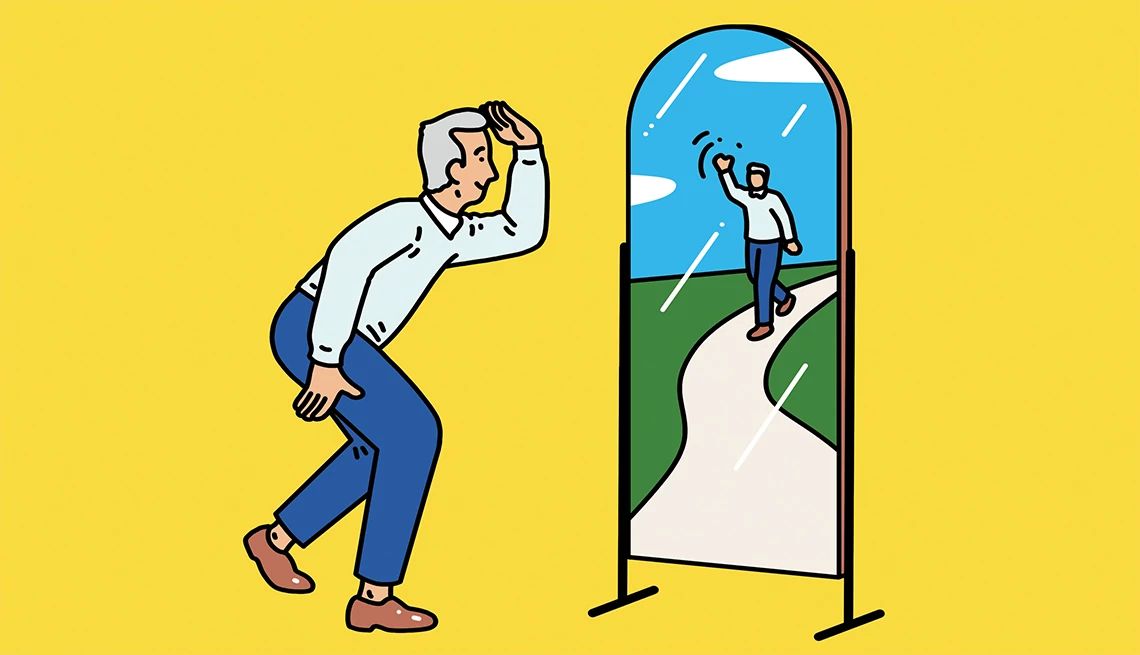AARP Hearing Center


Like gas in your car, purpose is fuel. With it, your engine will rev. Without it, it will stall and sputter. But finding purpose — especially if you’ve lost it — may require reprogramming your life. We’ve assembled 25 ideas to help you get started. Consider which ones might work for you, then weigh in with your own tips at the bottom of the page.
1. Find your people
The number one contributor to happiness is meaningful relationships with other people, according to researchers Robert Waldinger and Marc Schulz. Their book, The Good Life: Lessons From the World’s Longest Scientific Study of Happiness, was expanded from the Harvard Study of Adult Development, which began in 1938 as a decades-long effort to track the happiness of more than 700 men. Meaningful relationships might also be the key to finding purpose, says Steve Cole, professor of medicine and psychiatry and biobehavioral sciences at the UCLA School of Medicine. Cole says purpose typically requires partnership. “There’s almost nothing we really want to do that we can do by ourselves,” he says. “It’s very hard to save the whales, for example, unless you’ve got a community of other people to help you. Because the whales are just too big.” If purpose requires community, social groups can be good places to find it, suggests Cole, who recommends joining a club, church or other organization.
2. Start a ‘purpose club’
If you can’t find a group to join, create your own, suggests Aaron Hurst, author of The Purpose Economy: How Your Desire for Impact, Personal Growth and Community is Changing the World. “Purpose ideally is not a solo sport. It’s a team sport. Finding people to be on the journey with you not only makes it much more likely to be fulfilling but also much more likely that you’ll actually do it,” Hurst says. “You’ve had a book club. Why not create a purpose club? … We know that purpose extends lifespan and that connection extends lifespan. When you combine the two of them, you’re in the zone.”
3. Share your knowledge
Michelle Carlson, a professor of mental health at Johns Hopkins University, wondered if having a sense of purpose could improve the health of older adults. She designed an intervention to study the question: Experience Corps, a program through which older adults volunteered in public school classrooms. Those who participated saw improvements in mobility, memory, strength and cognition, as well as social and psychological engagement — which led Carlson to conclude that teaching, mentoring and other forms of knowledge sharing can be effective conduits to finding purpose. “As a culture, we need to think about aging as not just a time to get stale and avoid disease, but a time to harness the wisdom that it took a lifetime to accumulate, and then channel it back to a new generation,” Carlson says.
4. Take care of someone or something
Anyone who’s had to care for an ill spouse or an aging parent knows that caregiving can be extremely challenging and depleting. It also can be extremely rewarding and beneficial, research finds. A 2023 study published in the journal Advances in Life Course Research found that becoming a caregiver to a loved one can decrease symptoms of depression. Researchers at Johns Hopkins University similarly have found that caregivers tend to live longer than non-caregivers, presumably because the positive rewards of caregiving buffer the negative stress it can cause. And it’s not just caring for people. Studies have found health benefits in people who care for plants, pets or even vehicles. “If I love taking care of my car, and I go off to a car show every weekend where there’s 100 other people with well-polished cars, what good does that do? It’s not like we’ve solved global warming or eradicated cancer, but there is something about the experience of making the world more beautiful and more inspiring that’s very strong for the human spirit,” Cole says.


5. Commit random acts of kindness
Small gestures can make a big impact. A 2022 study published in The Journal of Positive Psychology showed that when participants performed three random acts of kindness on two days of the week for five weeks, those with symptoms of anxiety and depression felt less depressed and anxious, had fewer negative feelings and reported being more satisfied with life. “Almost everybody is happy to get a little bit of help here and there,” Cole says. “These are powerfully rewarding experiences in the human brain — having another human being say: ‘You’ve helped me.’ ‘You’ve reduced my suffering.’ ‘You’ve helped make the world a better place.’ This is one of the secret sauces of human existence, because we are strongly wired to self-reward when other people appreciate us.”
6. Find your gift
If you want to find your purpose, find your talent. [Purpose] has to come from your values and what you care about, but it should also serve on your talents,” Cole says. “It’s not just about picking something that’s meaningful to you. It’s also about picking something that you do well, where you can easily make a contribution without too much strain.” If you’re a skilled computer programmer, for example, you might find purpose in teaching coding to disadvantaged youth or in lending your expertise to a philanthropic organization that could use a software-based solution to help with its mission. “Purpose is finding a fit between what you care about and what you naturally do well,” continues Cole, who says people often take their skills for granted.
7. Give what you’ve got
If you can find purpose in sharing your skills and talents, you might also share your resources. Although charitable giving can be a fantastic pathway to purpose for philanthropists, your resources don’t have to be financial. The important thing is to be intentional, says Kim Serrano, director of the Center for Inclusion and Belonging, a project of the nonprofit American Immigration Council, whose mission is building a more welcoming, inclusive and cohesive America. “Pursuing purpose … is inherently outward-focused and generous,” Serrano notes. “To get started, it can … be helpful to think about, ‘What is something I have in abundance that I can offer to others?’ One of the things I know many older adults have an abundance of is time. Availability is the best ability. If you like driving, that could look like offering to provide rides to the airport or medical appointments for people in your life. If you enjoy cooking, it could look like meal prepping and meal sharing with loved ones who just can’t find the extra minutes in the day to get it all done. If you are a walker, you can offer to take a neighbor’s dog with you on your next neighborhood stroll.”
8. Mind the gaps
For more than 20 years, Todd Kashdan has been studying curiosity. A professor of psychology at George Mason University and author of Curious? Discover the Missing Ingredient to a Fulfilling Life, he says his research has demonstrated that curiosity is closely linked to psychological well-being, including feelings of autonomy, competence and belonging. According to Kashdan, a good recipe for purpose is combining external curiosity — that is, curiosity about the world around you — with internal curiosity: curiosity about yourself. “Use external curiosity to ask yourself, ‘What does the world need?’ Find the gap,” Kashdan suggests. “Then, direct your curiosity inward to figure out what are the particular strengths, experiences, life events, perspectives and relationships that make you unlike anyone else who will ever walk the Earth again. When you combine those things together, you can begin to see what you uniquely can contribute to the world. And that will help you determine what your purpose should be.”
































































You Might Also Like
Top Tips for Finding Happiness
What foods to eat, embracing bright colors and more, our gladness gurus have strategies that may boost your mood
‘The Hidden Power of Purpose’
Meet four impassioned people age 50-plus and leading scientists who reveal the benefits of having purpose
How to Pursue a Worthwhile Life
‘Ikigai’ encourages people to find what matters to them and live a life with purpose and joy
More Members Only Access
Enjoy special content just for AARP members, including full-length films and books, AARP Smart Guides, celebrity Q&As, quizzes, tutorials and classes
Recommended for You